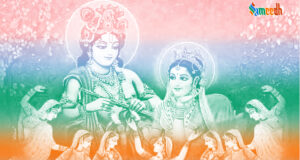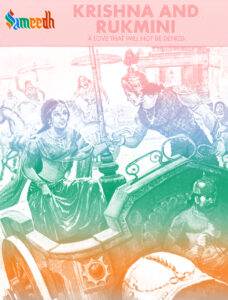The story of Lord Krushna’s marriages, including his marriage to Rukmini, is complex and varies across different Hindu texts and traditions. In the traditional narrative, Krushna’s marriage to Rukmini is often portrayed as a result of divine will, familial considerations, and the fulfillment of a promise.

The story of Lord Krushna’s marriages, including his marriage to Rukmini, is complex and varies across different Hindu texts and traditions. Rukmini was deeply devoted to Lord Krushna and desired him as her husband. She chose Krushna as her ideal spouse and prayed fervently for his companionship. Her devotion and penance were acknowledged by Krushna.

Rukmini was the princess of Vidarbha, and her brother Rukmi opposed her choice of Krushna as a husband. Rukmi, an ally of the Kauravas, wanted her to marry Shishupal, another powerful king. To honor Rukmini’s wish and to prevent her forced marriage to Shishupal, Krushna and Rukmini planned an arranged marriage. On the way to Dwarka, they encountered opposition from Rukmi and his forces. Krushna, with Rukmini’s consent, defeated Rukmi and his allies.
Krushna and Rukmini were married in a grand ceremony in Dwarka, solidifying their divine union. The marriage is considered a significant event in Hindu mythology and is often celebrated as a sacred bond between a devotee and the divine. One of the most famous and revered temples associated with Krushna and Rukmini is the Dwarkadhish Temple in Dwarka, Gujarat. Dwarka is considered one of the seven Moksh Puri (places of salvation) in Hinduism and is closely associated with Lord Krushna.
As for Radha, the relationship between Krushna and Radha is typically depicted as a divine and transcendental love that goes beyond the conventional marital framework. Radha is often considered the personification of pure devotion, and her love for Krushna is seen as the highest form of spiritual love.
The emphasis on Krushna’s marriage to Rukmini and the transcendental love with Radha represents different dimensions of the divine relationship in Hindu theology. While Rukmini’s marriage is part of the royal and societal narrative, Radha’s love is often portrayed as a symbolic representation of the soul’s deep yearning for union with the divine.
It’s important to note that interpretations and emphasis on specific aspects of these stories may vary across different sects, regions, and cultural traditions within Hinduism.